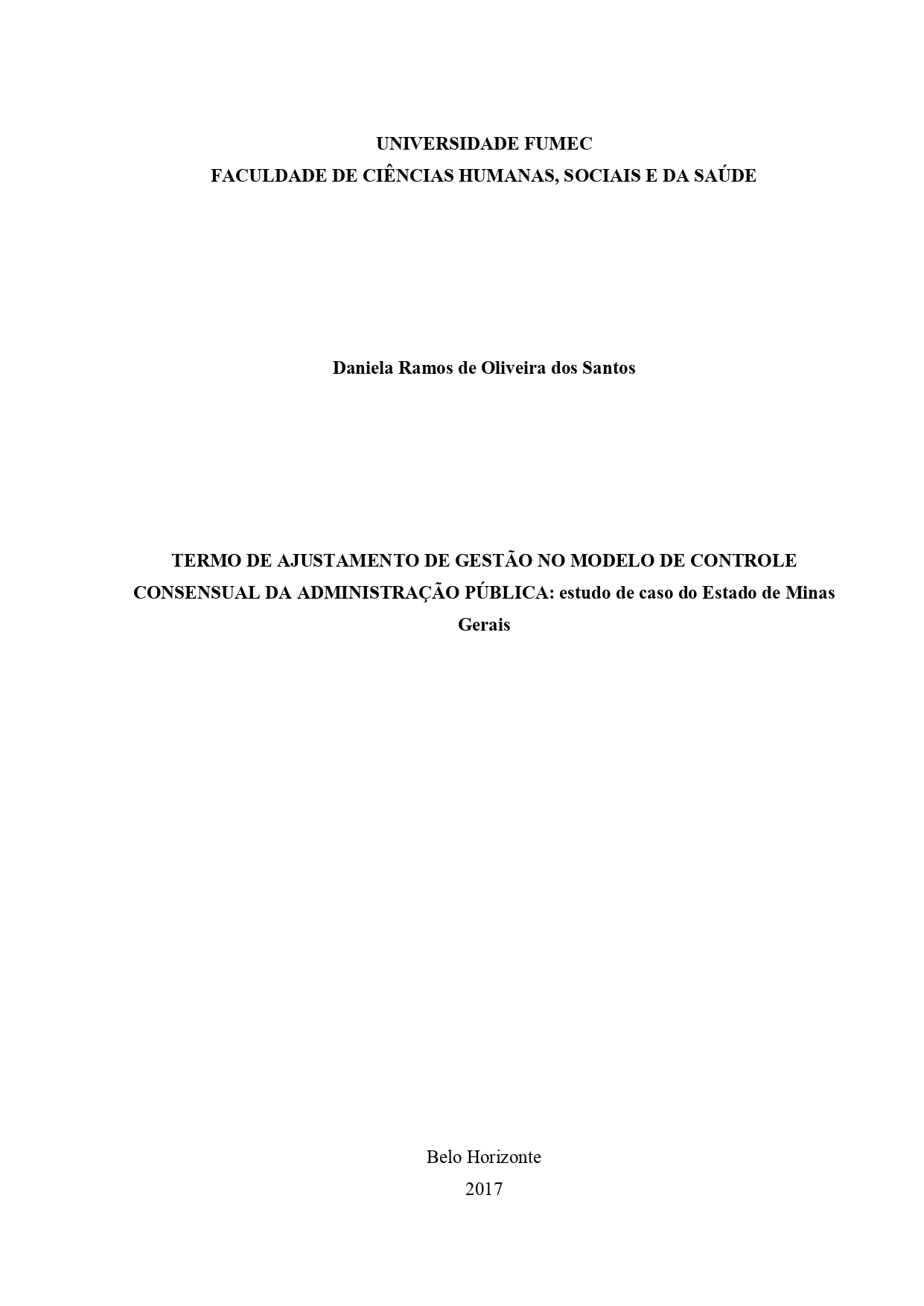Termo de ajustamento de gestão no modelo de controle consensual da administração pública: estudo de caso do Estado de Minas Gerais

Visualizar/
Data
2017Autor
Santos, Daniela Ramos de Oliveira dos
xmlui.mirage2.itemSummaryView.MetaData
Mostrar registro completoResumo
O estudo examina o Termo de Ajustamento de Gestão no modelo de controle consensual da
Administração Pública contemporânea. Para tanto, foi abordada a consensualidade como
tendência da Administração Pública no sistema de controle e os limites da aplicação de
mecanismos consensuais. Discutiram-se os aspectos gerais do sistema de controle na
Administração, como conceitos, finalidades e contexto histórico, tal como a função do
controle externo exercido pelos Tribunais de Contas e o controle interno na Administração
Pública. Ainda, discorreu-se sobre as características e o fundamento jurídico do Termo de
Ajustamento de Gestão na Administração Pública, bem como a adoção desse mecanismo nos
demais Tribunais de Contas do país, com a proposta de inclusão no Anteprojeto da Lei
Orgânica da Administração Pública Federal e no Anteprojeto de Lei Nacional do Processo de
Fiscalização dos Tribunais de Contas. O problema que se apresenta na pesquisa é o estudo do
caso do Termo de Ajustamento de Gestão referente ao Processo n. 862943, firmado em 2012
entre o Tribunal de Contas e o Estado de Minas Gerais, que pactuou investimentos na área da
saúde e educação em percentual inferior ao mínimo previsto nos arts. 198 e 212 da
CRFB/1988. Parte-se da hipótese de que o TAG é inconstitucional e ilegal, tendo em vista
que descumpriu a exigência constitucional no que diz respeito à vinculação de recursos
mínimos destinados às referidas áreas. Para responder ao problema enfrentado na pesquisa,
foi realizado estudo de caso, tendo sido a pesquisa de natureza dogmático-jurídica, uma vez
que analisou a CRFB/1988, a legislação infraconstitucional, resoluções e jurisprudência do
STF, bem como bibliográfica, por meio de livros, dissertações, teses, artigos e outros
materiais pertinentes à matéria. Adotou-se como referencial teórico a concepção de Patrícia
Baptista (2003) que, analisou a limitação de mecanismos consensuais no âmbito do controle
da Administração Pública, uma vez que a consensualidade não pode levar à abdicação de
funções pela Administração Pública, nem à eliminação de poderes públicos, atendo-se aos
limites constitucionais. Ao final do trabalho, concluiu-se que o Termo de Ajustamento de
Gestão n. 862943 é inconstitucional e ilegal sob a ótica da juridicidade administrativa, uma
vez que o Tribunal de Contas do Estado de Minas Gerais não cumpriu com sua função
fiscalizadora no controle da legalidade e na tutela dos direitos fundamentais que lhe compete.
Ainda foi possível concluir que o instrumento consensual de gestão no sistema de controle
não poderá ser adotado em situações que possuam previsão legal em sentido contrário, ou
ainda, que estejam em desconformidade com a visão sistêmica da ordem constitucional e com
os direitos e garantias fundamentais. The study examine the Term of Management Adjustment in the model of consensual control
of contemporary Public Administration. There fore, the consensuality was approached as a
tendency of the Public Administration in the control system and the limits of the application
of consensual mechanisms. The general aspects of the control system in Administration were
discussed, such as concepts, purposes and historical context. As example, the external control
function exercised by the Court of Accounts and internal control in Public Administration.
Also, the characteristics and legal basis of the Management Adjustment Term in Public
Administration were discussed. As well as the adoption of this mechanism in the other Courts
of Accounts of the country, with the proposal of inclusion in the Draft of the Organic Law of
the Federal Public Administration and in the preliminary Draft National Law of the Audit
Process in the Court of Accounts. The problem that is presented in the research is the study of
the case of the Term of Management Adjustment related to Process n. 862943. This
Process signed in 2012 between the Court of Accounts and the State of Minas Gerais, which
agreed investments in the area of health and education n a percentage lower than the
minimum established in art. 198 and 212 of the CRFB / 1988. It is based on the hypothesis
that the TAG is unconstitutional and illegal, since it has not complied with the constitutional
requirement regarding the linking of minimum resources to the said areas. In order to respond
to the problem faced in the research, a case study was carried out, and the research was
dogmatic-legal in nature, once it analyzed the CRFB / 1988, infra-constitutional legislation,
resolutions and jurisprudence of the STF, as well as bibliographical, through books,
dissertations, theses, articles and other materials pertinent to the subject. It was adopted as a
theoretical reference the conception of Patrícia Baptista (2003), who analyzed the limitation
of consensual mechanisms in the scope of control of Public Administration, since the
consensuality can not lead to the abdication of functions by the Public Administration, nor to
the elimination of Public authorities, in compliance with constitutional limits. At the end
of the study it was concluded that the Term of Management Adjustment n. 862943 is
unconstitutional and illegal from the point of view of administrative law, since the Court of
Accounts of the State of Minas Gerais has not complied with its supervisory function in
controlling the legality and in the protection of the fundamental rights that are its
responsibility. It was also possible to conclude that the consensual instrument of management
in the control system can not be adopted in situations that have legal provisions to the
contrary, or that are in disagreement with the systemic view of the constitutional order and
with rights and fundamental guarantees.
